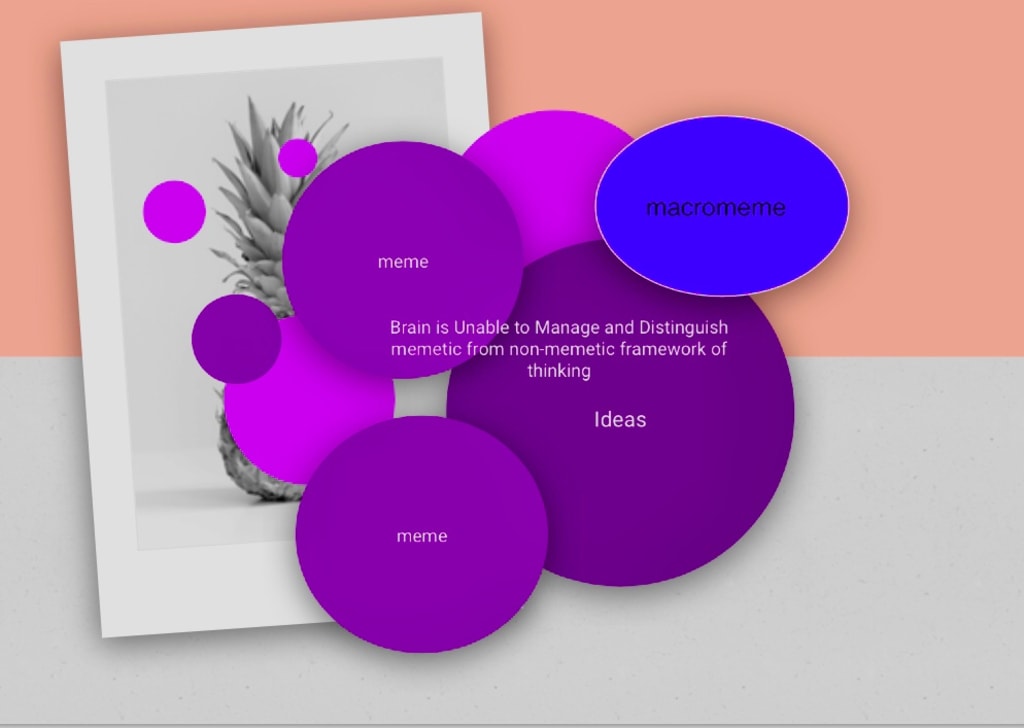
Here is how the reasoning process might work: https://docs.google.com/presentation/d/1XT0g4pSi080Pi4Z0YAH4vWnY4cPXmPJgtdnWgceO_OU/edit?usp=sharing
We could analyze the way aliefs, beliefs, and memes work in our minds. How would you react when asked to perform voodoo or walk on a glass bridge? It might be interesting to analyze our thoughts throughout the experiment.
The purpose was to see if you would do the experiment at all because you may think it’s so ridiculous. We do have conflicting beliefs and responses even when we know the experiment is intrinsically irrational.
———————————————————————————————————————
This is also a link to a quiz that shows how we are easily followers of memes. Feel free to share your answers on metamemeticreflections.blogspot.com. You can also make comments on these slides:
https://drive.google.com/file/d/1aTrsthtwpcLMFxjpFdQUOfLNDlUNKIqf/view?usp=sharing. ———————————————————————————————————————
Take note or map out the collection and execution of memes throughout your life. For example, we keep having ideas about ourselves and who we should be according to someone in a particular situation at a particular time (horizontal changes). (There are many variables to use). What ideas have changed over time and why? Align these with changes in your thinking about those things today (verticals changes). Modern changes are added to previous changes, even if we think the old is scraped away. Thoughts can be suppressed and still influence us.
———————————————————————————————————————
Compile a comic book with depictions of fallacies that your create Your own interpretations for as long as they are logical, such as the straw-man fallacy, appeal to the stone fallacy, etc. a website like pontoon or canva or pixton work well for storyboard elements.
———————————————————————————————————————
What if we try to look further into the origin of memes or see the symptoms rather than the problem behind the symptoms or the side effects? We could think of this like a nesting doll with something hidden inside another, more conspicuous motive, meme, or idea.
Here is an example: Side effects of memes: Stupidity -> laziness +
monologicality -> simplification + appeal groupthink - questioning -> ???
———————————————————————————————————————What if we observe the mechanics behind rituals and distinguish benefits or consequences from cultural exchange? This experiment is an attempt to encourage the study of memeplexes (psychical and psychological constructs of people having ideas and memes), interactions, and identifying healthy ones, distinguishing from memetic and unhealthy interactions.
When we learn or face something for the first time, how do we make sense of it, and what thoughts about it remain the next time we face that? Is what stayed the same helpful or not?
How does it make us less attentive to see the whole picture, remember all the details? What are some taboos and expectations of your culture those that strike about others and vice versa? Where does it interfere with your ideas?
———————————————————————————————————————
Distinguish your virtual self from the memetic self and the biological self.
This may intrinsically be a controversial activity, so it must be clear that
results extracted from this are for ((you)) and your reflection only. If possible,
set up a camera -or a few- ahead of time in a place you will reappear much of the day to adapt with your lifestyle.
You could also carry a small notepad around in your
pocket and record your thoughts as they come, but this leads to subjective observations due to
not remember correctly or distorted information.
Just be attentive.
You can do this without being ‘creepy.‘ If you don't feel like you can think
Without the influence of others, this will also affect how we think about reliability of information and what to do with it. Observing is void of making conclusions.
Digital experiences can be recorded through personal settings,
activity history, messages, photos, etc. Copy and paste all
these into a document. What have you noticed? While you
might have had little response in one area, but more in another area.
It would be much like going through a maze or tiki house or house of mirrors.
Maybe you will recognize that you associate more if more people
want there to be an association of meaning. But what other findings are gleaned from what you
recorded? You can tell yourself that you do not have to think like other
people in all cases. (Maybe we don’t. We do subjectively think differently,
and if possible, we will multi logically think differently, diversely, given the
intention and challenging our framework of thinking.
————————————————————————-————————————
This is an exploration into the meaning applied to infectious values within generational-based groups. Although there are useful values like patience, thinking in teams, pragmatism, and exploring individuality, others are not exactly logical. When you make something an ism, the ideas mean more than what is real, so individualism is actually against alternative ways of thinking.
Here is a chart outlining values based on four generations: https://drive.google.com/file/d/1zTTIIPlK0V671UMz9oQEchKh06kZCRAD/view?usp=drivesdk. Which might be concerning, and why? Or how? This should trigger deductive and analytical thinking.
———————————————————————————————————————
The problem within problem (idea of problem is hidden by the projection of the idea of problem). The brain is trained to be offended by words and criticism because it is identified with ideas of dangers where none exist (Fontanive, 2020). Offended people train their brain to be in danger from being criticized. The danger we associate with is death. Problems that are not technical are memetic.
How many problems are actually our relationship to what we see as a problem, our inability to solve it, or even understand it? This kind of question may come across as an accusation - which it is not intended to be conveyed as. Why are we focused on something so passionately if there is a possibility it does not need too much emotional attention? Given that passion itself has to do with emotions, how do we reason about them?
———————————————————————————————————————
Search and analyze how people are killed by memes or how memes can make people murderers. (I do not intend to set aside other theories of social science or psychology. Certainly, the Lucifer Effect and work by Stanley Milgram as well other experts on this matter are important to consider here.)
A very clear example is, unfortunately, killers that commit suicide. It is probably a relatively new idea that a person would kill themselves while killing someone else. Usually people have entered with the hopes of somewhat remaining alive. To remove the need to survive is literally the meme eating into a primal instinct.
The examples that come to mind are the Kamikazes and jihadis. Historically, people died for an dominating ideas that clustered people together against other clusters of people. The sophistication of memetic evolution and twisting with biological evolution would be important and surprising to study as well. Such implication is when the sophistication of memes actually prevented biological evolution, instead of memetic competition of warfare. (The latter could be considered genocide. Wars allow memes to compete. Genocide uses memes to kill biology and, if so, memes.
Suicide bombing is a whole new danger: not just taking chances to die, but dying anyway and taking others with you. When Richard Dawkins called memes a virus, he meant it seriously.
These ideas, coined ‘macromemes,’ include gods, nations, identities, etc. If we turn it and say kill because of a meme versus for something nonmemetic, we change from Conflict to War and Genocide. Conflicts, unfortunately, really just biological use of competition for survival. Maybe it is also something else? War is beginning at a disagreement about something, like territory ownership (which is and can be a meme), development of a strong memeplex - military, and instead of some sort of negotiation, we rather would have ideas survive. Despite the word, genocide is recent, it should be applied to other things that are described as what follows: Fight from a memetic origin in the name of a new meme.
Delusional thinking is also another example of memes killing the host such as when people get so delusional at the point where they think they should kill somebody to eventually stop some demonic possession (Fontanive, 2020).
Animal sacrifice is also another example of how memes can make people kill basing that on absolutely irrational reasons. In Bali for instance, animal sacrifice practiced a lot in certain main ceremonies. Every 25 years a massive ceremony takes place all over the island (ibid). Every single species of every animal and even plants living on the island has to be sacrificed, even insects!
In Nepal they also have an annual celebration where they kill thousands of cows.
——————————————————————————————————————
What are the qualities of our ability to make meaning of things?
Can we identify the mechanics of losing one ideology / internal memeplex and applying how we removed it elsewhere. Be careful because this can be confused with keeping a macromeme, but changing what appears to be one mindset for another. This is the case with religous, political, nationalistic, and ideological positions. Even if leaving all positions seems to be leaving the mechanism of a memetic mindset, something can still remain, taking place of a macromeme. Love can be replaced by passion. So long as something is leading, someone is following. Following can be natural and is not always bad, but can be a powerful part of memetic-lead violence.
Then let us see why following is not exactly going to end in us being killed, per se, by meaning. We could even take away the moral lens and ask why technical memes are need studied since they are not as relevant to memes in the mind. (We make meanings from the mind. Objective, technical meanings disregard memes).
If memes are about meanings, then why aren't things like computers and pharmacies memetic? I wonder if part of the answer is due to the fact that people involved in a pharmacy do not share their opinions to influence the making and application of who gets what perscription. Computer scientists also require codes and algorithms to get things done. Imagine if they just applied assumed codes to make a website - nothing would probably happen. The computer would not work.
Memetic thinking is applied to things via associating things to meanings indeed.
For instance: to us a certain tree in India is just a tree, to other people that tree is holy.
Today something new is happening: people who identify themselves with what they are not such as the gender issue: that is also a form of memetic thinking that takes place via associating meanings to people who in reality do not match the contents of those meanings (Fontanive, 2020).
Another way to think of this exercise is to distinguish memetic influences of unhealthy effects to biological existence. This includes our chemistry, our psychology, our social relationships, and so on.
———————————————
———————————————————————————————————————
Find a quote and see what is valid or invalid about it. Where are the premises behind the quote influenced by memes? How did you feel when you first read it? What, logically, is happening between your thoughts and interpretations? What values did we not realize were dormant but important once the quote drew them to our attention?
———————————————————————————————————————
Multilogical Thinking Prompt: Can you apply this Q & A elsewhere in life in the framework of your thinking?
What can we learn from not following? Diversify our thinking, being allowed to think, question, make mistakes, etc. it is hard to think of people who have not followed.
Were people in history
followers, if we try and think of those who did not follow? I tried to think of examples. The situations may have been different for different people.
Marie Anotinette was not that aware she was following another meme to avoid a macro memetic outrage from citizens of France. Galileo probably would have been seen as a martyr, so he was not penalized more
than he was already. He probably was allowed not to follow, and in this way, sort of was following that meme of sense of free will. Voltaire may have had advantages in the time of the ‘Enlightenment.” Aristotle ran away from Greece also, but not much else is recorded, and his death was from a natural cause.
——————————————————————————————————————
Neurological
Disclaimer: Despite a myriad of data collection about neurology and emotions, we want to be careful when we make clear distinctions theory from fact. (Subjective from objective).
Search for an infographic of neurotransmitters and apply this to reactions with emotions, whether they are natural causes or memetic causes.
Can you also locate an article on the neurological dynamics of each emotion, such as those
one for anger: https://www.ncbi.nlm.nih.gov/pmc/articles/PMC3260787/
—————————————————-
Think about the meanings we apply to holidays in the culture or region we grew up in. There are values attributed to the holidays as a central focus. Thanksgiving is linked to gratitude, is mostly memetic. Christmas is centered on the spurt of giving. We can be naturally empathetic and helpful, but there is a marketing lure and guilt-tempting for the giving.
Also mixed in is the integration or exchange of cultures.
The reality of making meaning for ourselves (which is called ‘appropriation’) probably contributes to what is seen as exploitation, or has to do with it. Implicit bias is involved. Intentional harm for sake of harm is memetic. There are memetic intentions, also, however, which is why conquest is not from human nature.
We should distinguish respect for people from respect for ideas and meanings. My observations are gleaned from examples that were found online. That vantage point might not be healthy, but that is what I am doing. Social media is an extension and fabrications of memes in our memeplexes. People seem to feel safer online.
“Social media and other online platforms provide a sense of safety because whatever happens online does not represent an imminent physical risk as well the relationship we have with online interactivity and people to people / group identity to grous identity- interfacing is permeated by a feeling of freedom, such as free speech and so on. All this is good but the problem is often represented by the circumstance where while feeling that we have a certain freedom definitely makes us feel good, eventually confident and in charge of something, in truth we usually don’t quite know how to manage that freedom, we don’t quite know what that is and if that is factual or just merely perceived due to online interactions. That is more digital and memetic freedom (Fontanive, 2019).
Holidays are intrinsically meaning we want to remember and don’t want to associate with memetic judging of good and bad. These holidays have set expectations about memes they represent.
Halloween can be about being something you aren’t. Identify as something you want to be, part from reality, or so on. The meaning can be more dangerous if we want something and go to dire means to meet our goal.
Valentine’s Day is for commercialized purposes. The meme seems to be appreciating love of a relationship. The goal of the replicating meme is that bond where “we’ll never let go of each other.” And if you do, it tends to be depressing and lonely as a holiday. We should think about love also, with its varying memes.






Comments
There are no comments for this story
Be the first to respond and start the conversation.